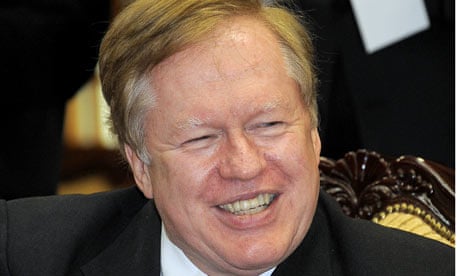North Korea today called for a formal peace treaty with the US as a precondition for its return to international talks about the country's nuclear programme.
However, in an apparent signal of Washington's scepticism about closer ties with the reclusive dictatorship, the US's new envoy on North Korea's human rights described Pyongyang's record on the issue as "appalling".
North Korea's foreign ministry said it wanted peace talks with Washington to work towards a more formal accord to replace the truce which ended the 1950-53 Korean war, bringing about Korea's separation. This would be a means for the North to re-enter six-party nuclear discussions involving the two Koreas, the US, China, Japan and Russia.
"If confidence is to be built between [North Korea] and the US, it is essential to conclude a peace treaty for terminating the state of war, a root cause of the hostile relations, to begin with," the official Korean Central News Agency quoted the foreign ministry as saying.
"The removal of the barrier of such discrimination and distrust as sanctions may soon lead to the opening of the six-party talks."
North Korea has boycotted the talks since April last year, shortly before it prompted grave international concern by announcing it had carried out a nuclear test. Before this, Pyongyang had begun to disable nuclear facilities in return for overseas aid.
There will be widespread mistrust in the US and elsewhere about North Korea's motives for making this offer. In October the country said it might be willing to go back to the six-party talks, but this was seen as a sop to the Chinese premier, Wen Jiabao, who was then visiting the country.
Washington has said it will discuss a peace treaty – North and South Korea remain technically at war – only after the North gets rid of its nuclear capabilities. The US special envoy, Stephen Bosworth, held inconclusive talks with Pyongyang in December to try to get the six-party talks restarted.
Barack Obama's new envoy on human rights in North Korea, Robert King, signalled today that the US was not willing to be quiet about abuses in the country, described by Amnesty International and similar groups as including routine forced labour and torture for political dissidents and their families, and arbitrary execution and imprisonment.
"It is one of the worst places in terms of the lack of human rights. The situation is appalling," Robert King told reporters in Seoul on his first trip to the region since taking up the post about six weeks ago, Reuters reported.
"A relationship with the US and North Korea will have to involve human rights," he said.
Obama's secretary of state, Hillary Clinton, was today setting off on a tour of Australasia and the Pacific during which she will meet Japan's foreign minister on a stopover in Hawaii. Clinton's 10-day trip will include Australia, New Zealand and Papua New Guinea.
